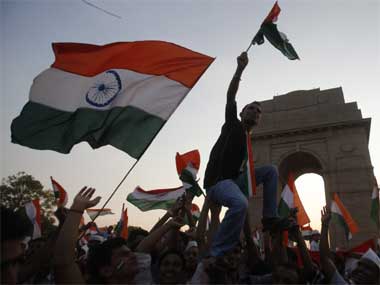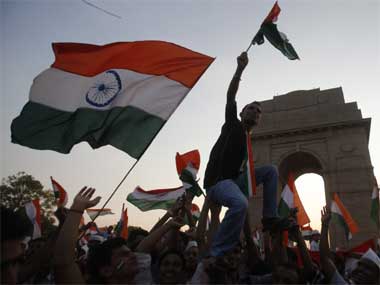In the animal menagerie metaphors that commentators are partial to, India is frequently likened to an elephant. There are, of course, certain points of similarity between the two. Like an elephant, India moves along at a stately, lumbering pace. Nimbleness and agility of foot don’t come naturally to us. And, like an elephant, which, despite its enormous power, allows itself to be tamed by a puny mahout with a goad, India has, despite its extraordinary unrealised potential for greatness, allowed itself to be domesticated and reined in by leaders with small minds. [caption id=“attachment_131487” align=“alignleft” width=“380” caption=“Here’s to a rejuvenation of India… Parivartan Sharma/Reuters”]
 [/caption] To many people, India’s sedate pace of locomotion, the stately speed at which change comes (if it does at all) is curiously comforting. Fearful of transformation, we are afraid to press down on the accelerator of social change. We allow ourselves to be slowed down by the eternally enduring fear of the ‘what if’: what if things go wrong? President
Pratibha Patil’s address overnight
, on the eve of Republic Day, is a classic example of the argument for doing nothing couched in the language of prudence. “While bringing about reforms and improving institutions, we have to be cautious that while shaking the tree to remove the bad fruit, we do not bring down the tree itself,” she said. And with the kind of feel-good optimism that she is constrained to conjure up on the eve of Republic Day, she pointed to the Indian Parliament and the judiciary as having done, and continuing to do, exemplary work. But that becalming message camouflages the thousand different problems that bedevil India, where everything from its polity to its society to its governance is characterised by deep-rooted flaws. Yet, we shrink from addressing them even superficially because we’re afraid of rocking the boat. Which is why even in this day and age, we live with the most perverse manifestations of caste-based discriminations, abject poverty, the world’s highest rate of child malnutrition – and countless other shames. There is, of course, much to celebrate about India’s evolution as a middle-income democracy. Days like today are an occasion to mark that progress. The pomp and pageantry at today’s Republic Day parades, in New Delhi and elsewhere, will give us many reasons to feel good about ourselves. Republic Day, which marks the anniversary when India gave itself a written Constitution, ought really to be about “We, the People”. And after today’s spectacular shows, when we return to our humdrum lives without immaculate marching band formations and showpiece tableus, we’ll again have to confront the reality of an imperfect India. And that India can be perfected only by dwelling not just on the things that make us feel good, but focussing on our failings, which ought to make us feel squeamish. And to do that, we have to go beyond Presidential platitudes - and embrace bold change. The governance template that we gave ourselves may have brought us this far, but already it’s the worse for wear. Politicians and rent-seekers have begun to game the system to their advantage, leaving ‘We, the People’ jaded and cynical in the extreme. What we need today more than ever is a rebooting of the system, which has slowed down to a crawl. We need to rejuvenate and reinvent ourselves, questioning every one of the dogmas and shibboleths that we’ve come to accept as inalienable. Only that can unleash a Renaissance of the Indian spirit, bend our minds - and the arc of history to our advantage. It’s time to throw caution to the winds - and take a giant leap of faith towards the destiny that awaits us. The only thing we risk losing is our fear of change, and that’s eminently worth losing.
[/caption] To many people, India’s sedate pace of locomotion, the stately speed at which change comes (if it does at all) is curiously comforting. Fearful of transformation, we are afraid to press down on the accelerator of social change. We allow ourselves to be slowed down by the eternally enduring fear of the ‘what if’: what if things go wrong? President
Pratibha Patil’s address overnight
, on the eve of Republic Day, is a classic example of the argument for doing nothing couched in the language of prudence. “While bringing about reforms and improving institutions, we have to be cautious that while shaking the tree to remove the bad fruit, we do not bring down the tree itself,” she said. And with the kind of feel-good optimism that she is constrained to conjure up on the eve of Republic Day, she pointed to the Indian Parliament and the judiciary as having done, and continuing to do, exemplary work. But that becalming message camouflages the thousand different problems that bedevil India, where everything from its polity to its society to its governance is characterised by deep-rooted flaws. Yet, we shrink from addressing them even superficially because we’re afraid of rocking the boat. Which is why even in this day and age, we live with the most perverse manifestations of caste-based discriminations, abject poverty, the world’s highest rate of child malnutrition – and countless other shames. There is, of course, much to celebrate about India’s evolution as a middle-income democracy. Days like today are an occasion to mark that progress. The pomp and pageantry at today’s Republic Day parades, in New Delhi and elsewhere, will give us many reasons to feel good about ourselves. Republic Day, which marks the anniversary when India gave itself a written Constitution, ought really to be about “We, the People”. And after today’s spectacular shows, when we return to our humdrum lives without immaculate marching band formations and showpiece tableus, we’ll again have to confront the reality of an imperfect India. And that India can be perfected only by dwelling not just on the things that make us feel good, but focussing on our failings, which ought to make us feel squeamish. And to do that, we have to go beyond Presidential platitudes - and embrace bold change. The governance template that we gave ourselves may have brought us this far, but already it’s the worse for wear. Politicians and rent-seekers have begun to game the system to their advantage, leaving ‘We, the People’ jaded and cynical in the extreme. What we need today more than ever is a rebooting of the system, which has slowed down to a crawl. We need to rejuvenate and reinvent ourselves, questioning every one of the dogmas and shibboleths that we’ve come to accept as inalienable. Only that can unleash a Renaissance of the Indian spirit, bend our minds - and the arc of history to our advantage. It’s time to throw caution to the winds - and take a giant leap of faith towards the destiny that awaits us. The only thing we risk losing is our fear of change, and that’s eminently worth losing.
Venky Vembu attained his first Fifteen Minutes of Fame in 1984, on the threshold of his career, when paparazzi pictures of him with Maneka Gandhi were splashed in the world media under the mischievous tag ‘International Affairs’. But that’s a story he’s saving up for his memoirs… Over 25 years, Venky worked in The Indian Express, Frontline newsmagazine, Outlook Money and DNA, before joining FirstPost ahead of its launch. Additionally, he has been published, at various times, in, among other publications, The Times of India, Hindustan Times, Outlook, and Outlook Traveller.
)